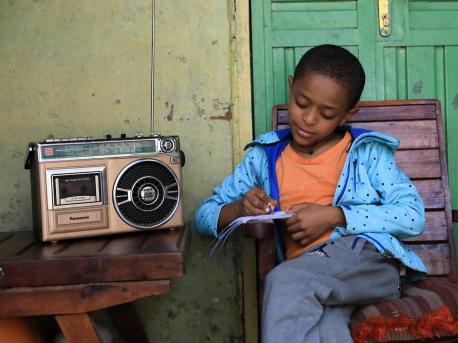
While Schools Are Closed, Radio Lessons Keep Students Learning
In the fall of 1937, a rapidly spreading virus with no known cure made it too dangerous for children to attend school in Chicago. The solution? Radio school.
Nearly 325,000 elementary school children tuned in daily to follow lessons broadcast by six cooperating radio stations. Chicago's successful experiment to keep children learning during a polio outbreak set a precedent for today's students forced out of school by the COVID-19 pandemic.

At the height of 2020 school closures to prevent the spread of the novel coronavirus, more than 90 percent of the world's children were out of school. UNICEF immediately began working with governments and partners to create remote-learning programs suited to the needs of out-of-school students, including online instruction and recorded lessons broadcast over radio and television. For some of the hardest-to-reach students, radio has been the key to maintaining much-needed educational continuity.
Above, 14-year-old Farhia listens to radio lessons in her home in Ethiopia. With funding from the UK government, UNICEF provided 20,000 solar radios for use by an estimated 72,000 children in remote villages in Ethiopia.

Above, 17-year-old George listens to a radio lesson in his family's living room in South Sudan in June 2020. "We don't have a radio, so I'm using my phone," he says. Now in his last year of secondary school, George is happy he can continue his education remotely so he can pursue his goal of becoming a doctor or a surgeon.
After South Sudan closed schools in March, UNICEF quickly collaborated with the Ministry of General Education and Instruction and the U.S. Agency for International Development (USAID) to ensure children could continue their education through remote learning. By the end of 2020, 32,000 radio sets had been distributed to help up to 160,000 children in South Sudan tune in to broadcast lessons.

Above, Samantha, 17, listens to radio lessons with her mother, Kayirangwa Mary Assoumpta, outside their home in Rwanda. In Rwanda, radio learning has been a critical solution to a growing problem. With 2.5 million Rwandan students from all backgrounds and geographical areas, radio education is the only solution that has been able to have such a broad reach across the socioeconomic spectrum.
Samantha is in her fourth year of high school, and studies tourism. UNICEF collaborated with partners to support the production and airing of new radio material that aligns with local curriculum. From 8:30 am to 2:00 pm, students across the country are able to tune in for interactive lessons on subjects including mathematics and literacy. While these lessons allow for students to participate on their own, parents and caregivers are encouraged to listen in and support learning at home.

Above, UNICEF provided exercise books and rechargeable portable radios so children in Mbandaka, Democratic Republic of the Congo could continue learning while schools are closed.
As schools slowly begin to reopen with the help of UNICEF guidelines, an estimated 25 million children worldwide are at risk of never returning to the classroom. Even after the pandemic, UNICEF will continue efforts to ensure that every child receives a quality education and access to vital school-based health, hygiene and nutrition services.
Photo credits, from top: In Ethiopia, Yedidiya attends school via radio through a program developed by the Ministry of Education with support from UNICEF. © UNICEF/UNI340664/Tesfaye. Ethiopia © UNICEF/UN0378720/Tesfaye, South Sudan © UNICEF/UNI334909/Ryeng, Rwanda © © UNICEF/UNI343983/Saleh, Democratic Republic of the Congo © UNICEF/UNI337878/Desjardins
HOW TO HELP
There are many ways to make a difference
War, famine, poverty, natural disasters — threats to the world's children keep coming. But UNICEF won't stop working to keep children healthy and safe.
UNICEF works in over 190 countries and territories — more places than any other children's organization. UNICEF has the world's largest humanitarian warehouse and, when disaster strikes, can get supplies almost anywhere within 72 hours. Constantly innovating, always advocating for a better world for children, UNICEF works to ensure that every child can grow up healthy, educated, protected and respected.
Would you like to help give all children the opportunity to reach their full potential? There are many ways to get involved.





